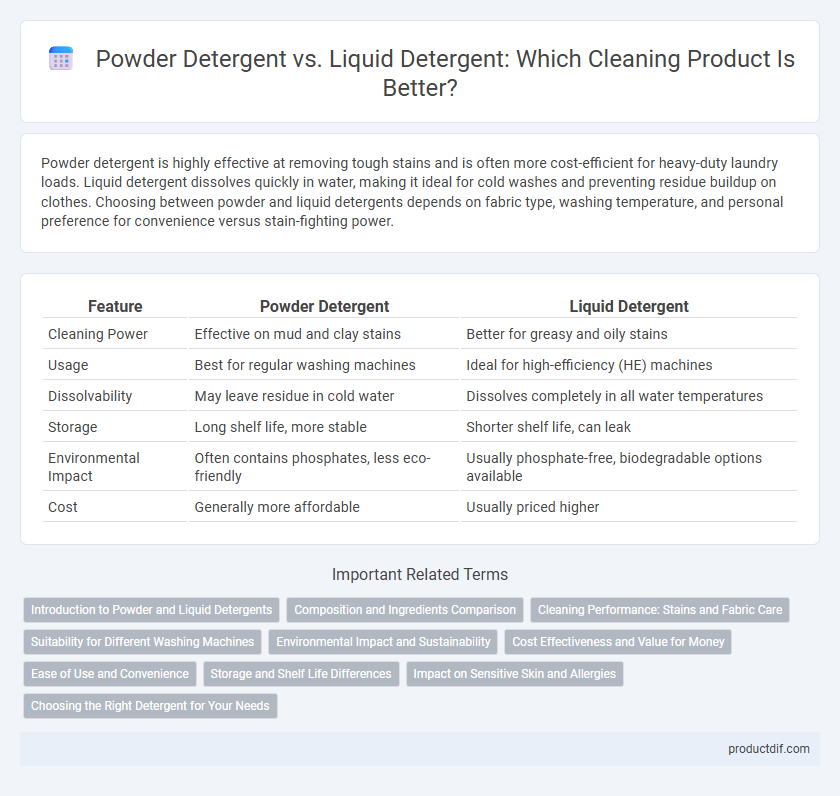Powder detergent is highly effective at removing tough stains and is often more cost-efficient for heavy-duty laundry loads. Liquid detergent dissolves quickly in water, making it ideal for cold washes and preventing residue buildup on clothes. Choosing between powder and liquid detergents depends on fabric type, washing temperature, and personal preference for convenience versus stain-fighting power.
Table of Comparison
| Feature | Powder Detergent | Liquid Detergent |
|---|---|---|
| Cleaning Power | Effective on mud and clay stains | Better for greasy and oily stains |
| Usage | Best for regular washing machines | Ideal for high-efficiency (HE) machines |
| Dissolvability | May leave residue in cold water | Dissolves completely in all water temperatures |
| Storage | Long shelf life, more stable | Shorter shelf life, can leak |
| Environmental Impact | Often contains phosphates, less eco-friendly | Usually phosphate-free, biodegradable options available |
| Cost | Generally more affordable | Usually priced higher |
Introduction to Powder and Liquid Detergents
Powder detergent consists of granulated or powdered cleaning agents ideal for removing ground-in dirt and clay, often offering effective stain removal and a longer shelf life due to its dry form. Liquid detergent contains concentrated surfactants and enzymes, excelling in dissolving quickly in water and targeting oily or greasy stains, making it suitable for cold water washing. Both forms contain surfactants, builders, and enzymes, but their formulations influence cleaning efficiency, storage, and usage in different laundry scenarios.
Composition and Ingredients Comparison
Powder detergents primarily contain surfactants, builders like sodium carbonate, and enzymes designed for effective grease and stain removal in hard water conditions, while liquid detergents often consist of liquid surfactants, solvents, and preservatives tailored for quick dissolving and performance in cold water. The composition of powder detergents typically includes fillers and anti-caking agents to maintain texture, contrasting with liquid detergents' emulsifiers and stabilizers that keep the formula consistent. Understanding the ingredient differences helps optimize cleaning power for specific laundry needs and fabric types.
Cleaning Performance: Stains and Fabric Care
Powder detergent often excels at removing ground-in dirt and clay stains due to its abrasive ingredients, making it effective for heavily soiled fabrics. Liquid detergent provides better performance on greasy or oily stains, as it dissolves quickly and penetrates fabric fibers more efficiently. Both formulations contain enzymes and surfactants tailored for fabric care, but liquid detergents generally preserve colors and delicate fabrics better because they dissolve completely without leaving residues.
Suitability for Different Washing Machines
Powder detergent is ideal for standard and high-efficiency (HE) washing machines, effectively removing ground-in dirt and stains due to its powerful cleaning agents and ability to maintain stability in both cold and hot water. Liquid detergent is better suited for delicate fabrics and front-loading machines because it dissolves quickly, preventing residue buildup and ensuring gentler cleaning. Manufacturers often recommend liquid detergents for HE machines to reduce the risk of excess suds and optimize rinse cycles.
Environmental Impact and Sustainability
Powder detergents generally have a lower environmental impact due to their concentrated formula and reduced plastic packaging, which decreases waste and carbon footprint during transportation. Liquid detergents often contain higher levels of water and synthetic chemicals, leading to greater energy consumption in production and potential water pollution. Choosing biodegradable, phosphate-free powder detergents promotes sustainability by minimizing ecological harm and supporting efficient resource use.
Cost Effectiveness and Value for Money
Powder detergent generally offers greater cost effectiveness due to its lower price per load compared to liquid detergent, making it ideal for bulk purchases and high-volume use. Liquid detergent, while often more expensive, provides better value for money in tackling tougher stains and dissolves more efficiently in cold water, reducing waste. Consumers seeking budget-friendly options prioritize powder detergent, whereas those needing versatile stain removal may find liquid detergent more cost-efficient over time.
Ease of Use and Convenience
Powder detergent requires measuring and dissolving, which can sometimes leave residue if not fully dissolved, making it slightly less convenient for quick laundry loads. Liquid detergent offers easy pouring with no need for pre-dissolving, allowing for seamless use in both standard and high-efficiency washing machines. The pre-measured liquid format often includes caps designed for dosing, enhancing user convenience and reducing mess during laundry routines.
Storage and Shelf Life Differences
Powder detergents generally have a longer shelf life, often lasting up to two years when stored in a cool, dry place, due to their stable, low-moisture formula. Liquid detergents usually have a shelf life of about one year and require airtight containers to prevent water contamination and maintain their cleaning efficacy. Proper storage conditions, such as avoiding exposure to humidity and extreme temperatures, are critical for preserving the performance and safety of both powder and liquid detergents.
Impact on Sensitive Skin and Allergies
Powder detergents often contain fragrances and optical brighteners that can irritate sensitive skin and trigger allergies, whereas liquid detergents typically offer hypoallergenic formulas designed for gentle cleansing. Liquid detergents dissolve completely in water, reducing residue left on fabrics that might cause skin reactions, making them a preferred choice for individuals with eczema or other dermatological sensitivities. Choosing detergents labeled as dermatologically tested or free from dyes and fragrances helps minimize allergic responses and maintain skin health.
Choosing the Right Detergent for Your Needs
Powder detergent offers superior stain removal and is often more effective for heavily soiled clothes, making it ideal for budget-conscious consumers and hard water conditions. Liquid detergent excels in pre-treating stains and dissolves quickly in cold water, perfect for delicate fabrics and quick wash cycles. Selecting the right detergent depends on fabric type, stain severity, washing temperature, and personal preferences regarding convenience and cost-efficiency.
Powder detergent vs Liquid detergent Infographic

 productdif.com
productdif.com